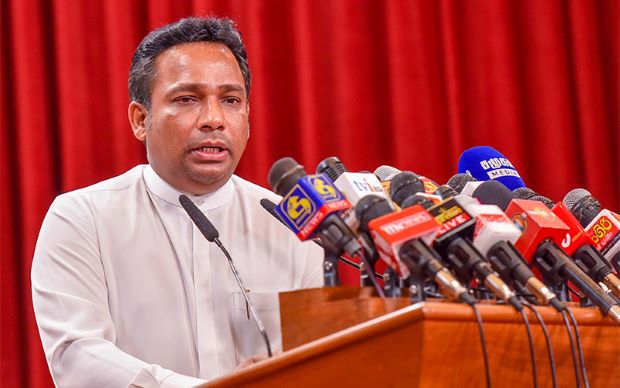COLOMBO – Tamil political leaders in Sri Lanka must collaborate with President Ranil Wickremesinghe’s “flexible approach to achieve national unity” and address the challenges faced by the Tamil population, State Minister of Trade S. Viyalanderan said.
Viyalanderan told reporters on Tuesday (17) that it was commendable that Wickremesinghe had appointed a Tamil person as Governor of the Eastern Province for the first time in history.
“We express gratitude to the president for this significant step. The incumbent president is particularly dedicated to addressing the concerns of the Tamil community and his flexibility provides an opportunity for Tamil leaders to engage in constructive dialogue to resolve our issues. This should be regarded as their shared responsibility,” he said.
Viyalanderan said the government must actively involve Tamil leaders and civil society activists in discussions concerning challenges faced by the community.
“This process must be expedited,” he said.
Viyalanderan said it was essential to acknowledge that, within the brief period available, the government had initiated numerous projects, and that they would continue implementing development initiatives, including road construction, bridge projects and improvements in agriculture and fisheries, as well as enhancing the livelihoods of the citizens. “Measures have also been taken to combat unauthorized sand mining in the Eastern Province, with a focus on environmental preservation and resource conservation,” he added.
Talks between President Wickremesinghe and Tamil MPs so far have been largely unsuccessful, with discussion on the full implementation of the 13th Amendment to the Constitution virtually at a standstill.
Prime Minister Narendra Modi told Wickremesinghe during a July visit that India expects Sri Lanka to implement the 13th Amendment to the Constitution to ensure a life of “dignity and respect” for the island nation’s Tamil community.
However, according to Jaffna district MP and former Northern Province Chief Minister C. V. Vigenswaran, Wickremesinghe is keen to implement the 13th Amendment and is open to discussing devolution of police powers to the provinces.
The 13th Amendment to the Constitution emerged from the controversial Indo-Lanka Accord of 1987 as a purported solution to the worsening ethnic conflict, four years after war broke out. Provincial councils came in the wake of this amendment, though land and police powers have yet to be devolved to the provinces as originally envisioned. Both Sinhalese and Tamil nationalists have historically opposed the amendment, the former claiming it devolved too much, the latter complaining it didn’t devolve enough.
A full implementation of the amendment would see land and police powers devolved to the provinces, a development that is not likely to garner support from Sri Lanka’s more nationalist-oriented parties including sections of the ruling Sri Lanka Podujana Peramuna (SLPP). In February, sections of Sri Lanka’s Buddhist clergy took to the streets against the proposed full implementation of the constitutional amendment.
-economynext.com



Comments are closed, but trackbacks and pingbacks are open.